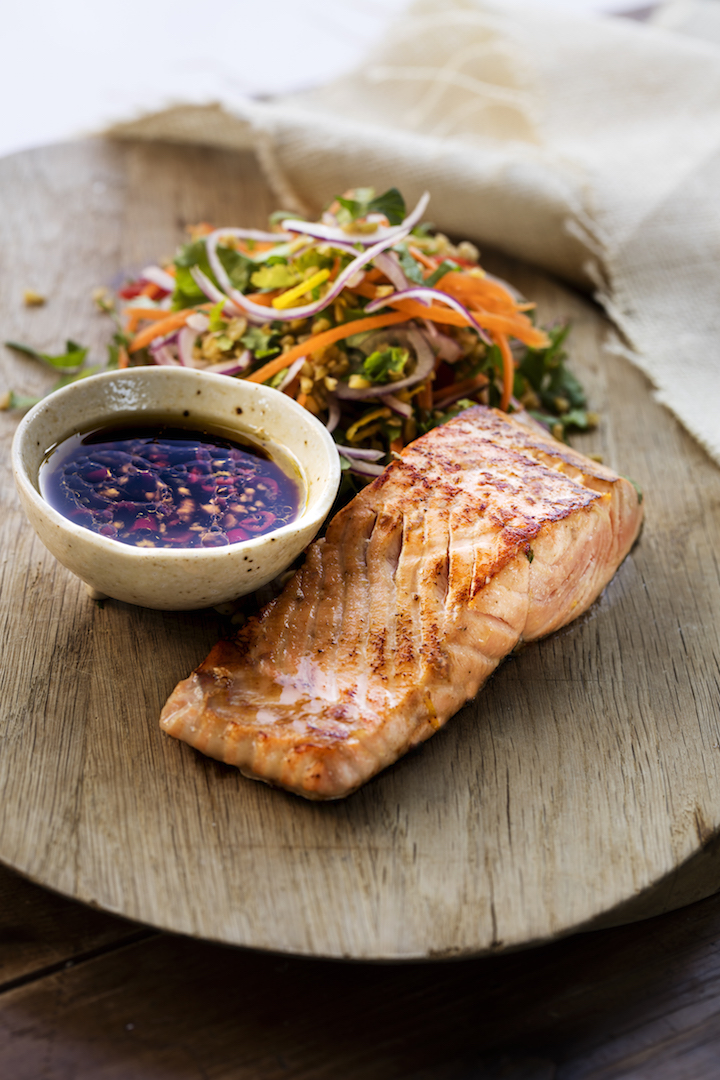Inflammation plays both a protective and nonprotective role in the body. Specifically, inflammation defends us from pathogens and helps our body heal. However, too much inflammation can lead to increased risk of chronic disease.
One of the greatest influences on the level of inflammation in our body is our diet! The foods we eat can either have an anti-inflammatory or inflammatory effect.
Many anti-inflammatory diets have been proposed and the main components they all have in common are the following:
- High omega-3 fatty acid intake – omega-3 fatty acids exert an anti-inflammatory effect in the body. Food sources of omega-3 fats includes fatty fish (salmon, sardines, mackerel), chia seeds, hemp seeds, walnuts and flaxseeds/oil.
- Low refined sugar intake – refined sugar is known to spike insulin levels, which if triggered in excess can lead to inflammation.
- Low-moderate kilojoule intake – research has shown excess kilojoule consumption is linked to production of inflammation in the hypothalamus (region of brain controlling appetite) and in turn causes increased appetite. This means just eating enough overall or a bit less than usual if weight loss is a goal, is beneficial for reducing inflammation.
- High fibre intake – research has shown a link between high fibre diets and reduced markers of inflammation. Fibre is necessary to support a healthy microbe balance in our digestive tract and most fibre-rich foods also offer a source of antioxidants.
- Regular use of spices – spices such as ginger and turmeric are well known for their potent anti-inflammatory effect in the body. Using ginger and turmeric daily in cooking is a good way to increase the overall anti-inflammatory effect of your diet.
- High fruit and vegetable intake – fruit and vegetables offer a great source fibre, vitamins and minerals and many compounds found in fruit/veg including photochemical have been linked to anti-inflammatory and anti-oxidant effects. The more colourful the fruit/veg the more benefit it has to offer and always include a mix or raw and lightly cooked fruit/veg in your diet.
If you are interested in eating in a more anti-inflammatory way, try implementing some of the above tips and here is an anti-inflammatory recipe to get you started!
Citrus Marinated Salmon with Freekeh Salad
Tip: can freekeh or brown rice or quinoa if preferred
Serves: 2
Pre: 10-15 minutes
Cooking: 30 minutes
Gluten Free
Ingredients
½ cup uncooked freekeh
¼ cup carrots, julienned
¼ cup chopped capsicum
¼ cup chopped parsley
¼ cup chopped coriander
½ Spanish onion
1 tsp. lemon juice
1 tsp. lime juice
½ tbsp. orange juice
1 garlic cloves
½ tbsp. tamari soy sauce
1 tbsp. EV olive oil
1 tsp. fresh ginger
1 tsp. fresh chilli
1-2 tbsp. sheep’s milk yoghurt
Marinade for the salmon:
½ tbsp. lemon juice
1 tsp. lemon zest
½ tbsp. lime juice
1 tsp. lime zest
½ tbsp. orange juice
1 tsp. orange zest
2 x 150-200g salmon
Method
Rinse freekeh and drain. Add 1½ -2 cups of water, bring to a boil, cover and simmer for about 15 minutes, or until the water is absorbed. Remove from heat and let stand for 10 minutes.
Mix carrot, capsicum, parsley, coriander and Spanish onion in large bowl. Add room temperature freekeh and toss to combine. Whisk together lemon, orange and lime juices, tamari, ginger, garlic and chilli. Pour over salad and combine well.
Place all the citrus dressings in a bowl including the salmon and let it marinate for 10-15 minutes. Lightly pan-fry the salmon until slightly pink in the middle.
Serve salmon on a bed of the freekeh salad and a dollop of sheep’s milk yoghurt.
